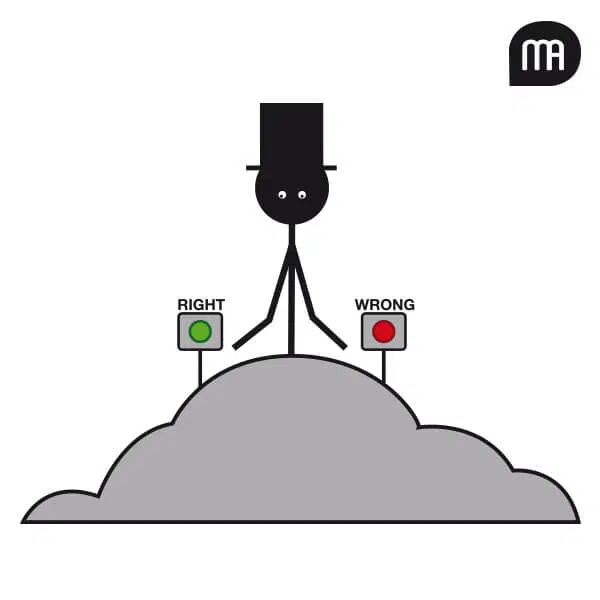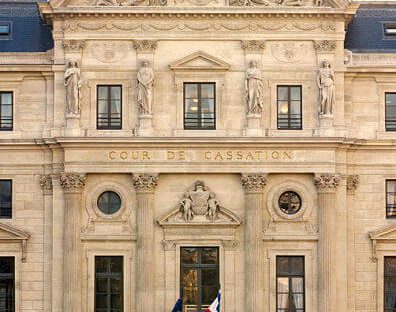
“This project is unacceptable, and we ask that it be rethought from top to bottom.”
Although the controversy concerns the functional, economic and aesthetic aspects of the project, it raises moral questions. In this article, we focus on one of them. The tone, vocabulary and style of the article published in Le Monde are rather sharp: “soothing speeches,” “serious offense,” “indecent,” “serious urban error,” “absurd,” “denature,” “unacceptable,” “endanger,” “ridiculous,” “pharaonic project.” These formal elements reinforce the substantial elements – the reasons for opposition to the project – and suggest that the general argument presented by the collective is indisputable (2). But what meaning can be given to the impression that this argument is indisputable? There are several possibilities. Here are three of them:
(1) After considering the argument, a reasonable person should agree with it.
2) The authors of the opinion article spoke on behalf of any reasonable person, or on behalf of reason.
3) Their position is identical to that which an impartial judge or ideal observer would have taken.
Each of these possibilities would merit a long discussion, but the third is troubling. Because to know if the argument of the opinion article published in Le Monde is the one that an impartial judge or an ideal observer would have defended, it would have to be possible to ask him for confirmation. However, this character does not exist in the flesh. It is an abstract entity that can only be grasped through a definition, specifying its characteristics. Intuitively, it seems simple to define it in broad terms. It should be impartial, that is, without bias, by treating the interests at stake equally. He should also be aware of these interests. He could thus proceed with what philosopher Bernard Williams calls a “role-reversal test,” which consists in putting oneself in the shoes of others “and think what I would want or prefer if I were in their positions” (3). This test is related to the ideal observer (we keep this expression alone in the following) since, if a large number of people were affected by a decision or a project such as the reorganisation of the Gare du Nord station, the person who would put him or herself in the shoes of others would have to place him or herself in everyone’s shoes:
“If anyone carried out an ideally complete thought experiment under these requirements, he would actually acquire preferences that would correspond to every preference held by anyone who was affected by the situation. All the preferences would thus be agglomerated into one individual.”
Philosopher Roderick Firth tried to specify the minimum characteristics of an ideal observer (4). On the one hand, it is defined as a fictitious person who reacts in a certain way to concrete situations, his reactions making it possible to determine the appropriate moral judgment on the situation in question (5). On the other hand, an ideal observer would have six essential characteristics:
– he would be omniscient – “an ideal observer must be characterized in part by reference to his knowledge of non-ethical facts” – and his full knowledge of the facts characteristic of a situation would include the past as well as the future (6);
– he would be endowed with “extraordinary powers of imagination,” which go hand in hand with omniscience and evoke the role-reversal test we mentioned above;
– he would be completely disinterested, unlike real human beings who sometimes feel that they cannot adopt a position of impartiality; Firth defines the impartiality of the ideal observer as the fact of not being influenced by particular interests;
– he would be without passion (dispassionate), i.e. his reactions would not be affected by its own interests or emotions; it may seem curious that an ideal observer could have interests, but Firth answers this objection that “it seems unlikely that an ideal observer who had no interests at all would ever have any ethically-significant reactions;”
– he would be consistent, having similar reactions to similar situations;
– finally, since these characteristics have been acquired, he would otherwise be like a normal person.
It should be noted that these qualities can, in theory, be carried by a person in the flesh. We could even try to check if the authors of the opinion article published in Le Monde
– took into account all the facts,
– have shown imagination,
– did not act for the benefit of hidden interests,
– have not been under the influence of passions,
– and were consistent in the sense that they would have made (and, where applicable, did make) the same judgment on similar projects.
Finally, one could risk the hypothesis that if their argument seems, at first sight, indisputable, it is because the signatories of the opinion article give the impression of implementing the qualities of the ideal observer in the context of the Gare du Nord station transformation project. That would be a convincing way of saying that their argument is fully rational.
Alain Anquetil (1) “Le projet de transformation de la gare du Nord est inacceptable,” Le Monde, 3 September 2019. About the project, see “Gare du Nord : les cinq choses à savoir sur la transformation colossale qui se prépare,” Le Moniteur, 10 July 2018. (2) It should be noted that SNCF (the French State-owned railway company) replied the same day: “Transformation de la Gare du Nord : ‘Notre projet propose une nouvelle ouverture vers la ville’,” Le Monde, 3 September 2019. (3) B. Williams, Ethics and the limits of philosophy, Harvard University Press, 1985. (4) R. Firth, “Ethical absolutism and the Ideal Observer,” Philosophy and Phenomenological Research, 12(3), 1952, pp. 317-345. (5) He is therefore not a moral judge strictly speaking. (6) Firth distinguishes here between deontological moral perspectives, oriented towards the past, and utilitarian moral perspectives, oriented towards the future. [cite]




